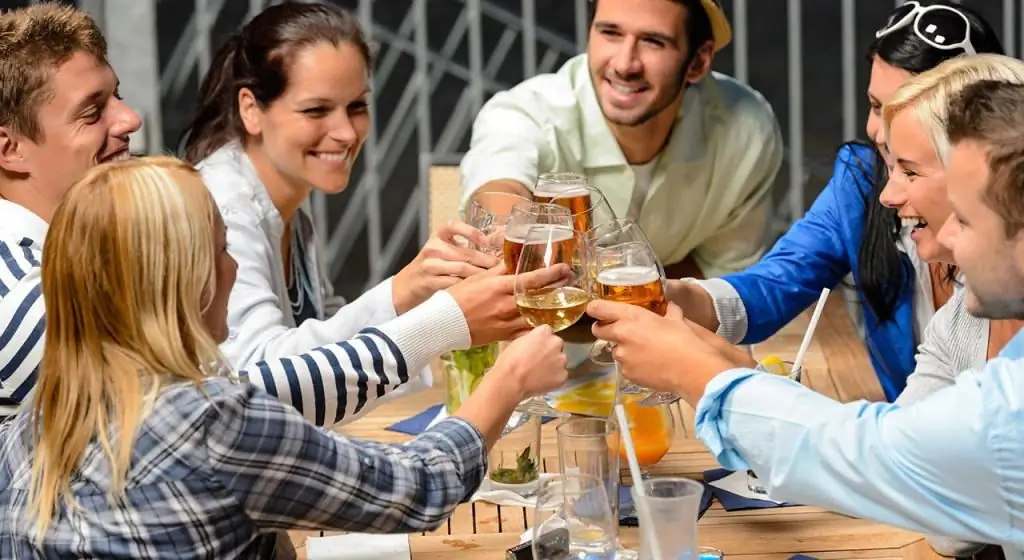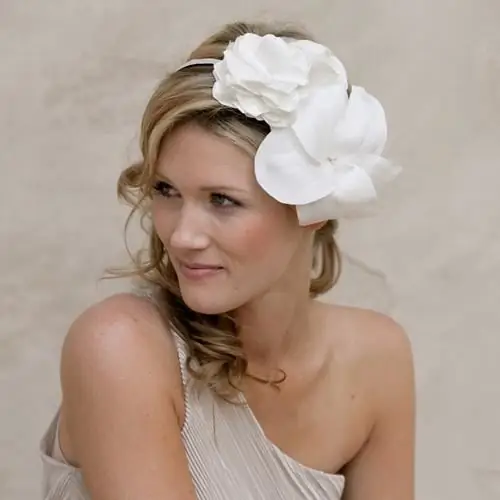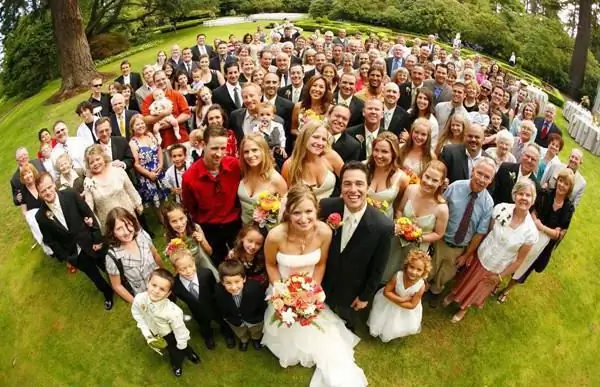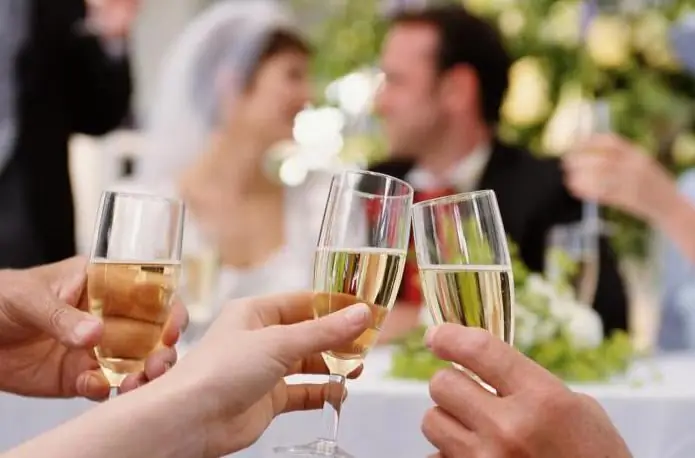2026 Author: Priscilla Miln | miln@babymagazinclub.com. Last modified: 2025-01-22 17:55:21
Everyone knows that it is customary to say congratulatory toasts at the wedding table. But what wedding toasts should be, whether they need to be said in a certain order or can it be done on a whim, who pronounces the first congratulations and whether it is worth getting carried away with long texts - answers to such questions are usually sought immediately before the celebration.
Where did the tradition of toasting come from?
Where the tradition of table speeches came from, no one can answer. This custom is present in every culture in all corners of the planet. But the very word "toast" has a very traceable history.
In Greece, and later in Rome, it was customary to ennoble wine that failed to taste with the help of bread dried on fire. It was done directly by those who drank, and not by butlers. The time that was required for drying the bread and aging it in a glass had to be filled with something. In Greece, the one who came up with the idea of speech,yelled a toast. Later, in Rome, where they feasted lying down, the custom was transformed. The feaster, wanting to change the taste of the wine, shouted “toast” and raised a glass, this was a signal for the servants, who were required to dry it on the fire and bring a piece of bread.
Thanks to the geography of the conquests, this custom, together with the feasting Romans, ended up in Europe. The tradition itself has been forgotten, but the word "toast" has firmly entered into speech everywhere, while retaining both meanings - dried bread and table speech.
Bitter, sweet or sour?
It is customary for young people to end wedding toasts with the word “Bitter!”. Every person also knows this, regardless of whether he has been to a wedding at least once. But few people know that "Bitter!" - not only a saying, but also a completely independent toast.

It refers to short table speeches calling for action. The Scandinavian countries are considered to be the birthplace of this custom. As a rule, such toasts contain one or a couple of words, after which the feasters need to do something.
Traditional wedding toasts, short and action-packed, are:
- "Bitter!";
- "Sweet!";
- "Sour!".
They all call for only one thing - a kiss. The first is addressed to the newlyweds, "Sweet!" means kissing parents on both sides, and "Sour!" requires the expression of feelings from witnesses. The latter does not imply a serious relationship and may well become caricatured if two men have to kiss, for example.
What is toast?
This is a wishhe alth, as the word is often understood. But in table customs, this is a short toast, calling on the guests present to wish the heroes of the celebration of he alth.
Toast is a traditional Slavic table tradition. Like a number of other Slavic traditions adopted at feasts, the toast does not require action from those to whom it is addressed. The call is addressed to the guests, who, after the pronounced toast, should stand up and, raising their glasses in front of them, support the toast.
In the old days, it looked like this: all those present rose, it was said in unison - “for he alth” or “long years”, depending on the content of the toast. After that, the goblets were emptied to the bottom, it was impossible to leave the wine with the pronounced toast. When the guests drank, the newlyweds bowed, saying “we will be he althy!” and emptied their own cups. Only then could everyone sit down and continue the feast.
Who opens the feast?
The very first wedding toast to newlyweds is always made by the father of the bride. If it is not there, then the “planted father” does it. If he is not there, then the right to open a wedding feast passes to the eldest of the male relatives. If there are none, then the toast is made either by a witness from the bride's side, or by one of the friends.

If there are none, then the right to toast goes to the oldest male guest from the side of the bride. The girl's mother, any other relative or witness does not say the first toast. Just as the guests from the groom's side do not.
There areplace for impromptu
Organization of a wedding is similar to the Western judicial system in one nuance. They are united by the presence of such a phenomenon as a "precedent". Every organizer who is creative in arranging celebrations has a lot of interesting stories from the past that have become a kind of “wedding precedent.”
There is a rather interesting story that happened at one of the noble weddings during the palace coups. All the aristocrats of St. Petersburg, one way or another, in those days were in political conspiracies. It so happened that the men invited from the side of the bride had to urgently leave the wedding and go "to overthrow the ruler." And it happened before the start of the celebration. A brilliant way out of this situation was found by a young husband. He himself said the first toast, arguing this act by the fact that among those present there is only one relative of the newlywed - her husband. And he was absolutely right, because the young people were already married, and in the tradition of the first toast, blood relationship does not matter.
This story is very instructive. Trying to distribute wedding toasts and congratulations strictly in accordance with accepted customs, many organizers of celebrations begin to think in patterns and stereotypes. This leads to a boring and banal wedding.

At any celebration there should be room for impromptu and creativity, even when it comes to the very first toast. In extreme cases, the host can also open the holiday.
Toast from parents - what's the best?
Wedding toasts from parents are the most touching partthe whole feast. They are always listened to attentively, often while wiping away a tear. This is how parental instructions look ideally.
In fact, quite often the reverse situation occurs. Instead of pathetically wiping away tears, videos or photos can show guests covering their mouths with their hands in an attempt to hide yawns, poking at salads or snacks, immersed in the contents of smartphones, and so on. The faces of the newlyweds at the same time express a lot of emotions - from polite patience to "falling into meditation." You can see a lot, but not tenderness or attention. It is not customary to interrupt the toasts of parents, so the toastmaster usually goes about his business at this time.

This happens not at all because of the insensitivity of the modern generation, but because of the wrong preparation of parents. Often, they not only do not rehearse their toasts, but do not even think them through. The result is a long story about what a wonderful girl the bride was, or how the groom grew up to be a sweet and smart boy. And it all comes down to how lucky the other side is in marriage. If the guests do not have time to fall asleep, then when the parents finish the speech, everyone goes out together for a smoke break, and those who are not prone to bad habits find another reason to leave the table.
To prevent this from happening, the parents' toasts must meet a number of conditions:
- first, from the father lasts no more than 7 minutes, the rest - 3-4;
- contain string;
- be filled with a short story;
- describeown attitude to the wedding in a few words;
- end with a call to drink to the young.
If you follow these simple rules, then the speech will not become boring. And you can fit everything you want to say not in one toast, but in several.
What to tell parents?
Wedding toasts and wishes for children are always made by parents themselves. But this does not mean that there are no ready-made options from which you can build on when thinking through your congratulations.

In the beginning of the first toast, you need to say who the person who is speaking is, but this should be done casually. You need to address both newlyweds in a toast, or you can do without addressing at all.
Example text:
My children! Yes, I have not forgotten that I only have a daughter (pause, the reaction of the guests, they usually laugh). But I was a mother only for (daughter's name) a couple of hours ago. Now I have two beautiful, best in this world and such beautiful children! And while everyone is celebrating the registration of your union, I celebrate the acquisition of a son and am happy to share with you (names of the groom's parents, turn in their direction) daughter.
And let advice and love be wished to the young on this day. I wish it to all our new and now large family. Advice and love to all of us!”
Traditional order for toasting
Wedding toasts traditionally have this order:
- father of the bride;
- the groom's parents, and from the second round of speeches and the newlywed;
- grandparents;
- godparents;
- sisters, brothers;
- witnesses;
- guests.
The recommended interval between toasts of the first round is 10-15 minutes, in the future this interval increases, but more than half an hour between toasts should not pass. Of course, this applies to the time when everyone is at the table. There is no need to interrupt competitions or dances for the sake of a toast.
Reciprocal toasts from the newlyweds
Reciprocal wedding toasts from the young must be pronounced for parents, grandparents, godparents. For the rest, it is not necessary to say a toast in response.

An example of a response toast from the newlyweds in verse:
Thank you for your kind words, For tenderness and love. Thank you.
And let us now have our own family, We did not fly out from under the wing.
On the contrary, (the name of the mother of the bride) found a son.
And the daughter came to (name of the groom's mother).
But you won't be entertaining this replenishment for long
Their huge and bright hearts. We promise to do soon
Of you (names of fathers) grandfathers instead of fathers.”
Reciprocal toasts should not be long and there is no place for humor in them. If you want to joke, you should answer witnesses or well-known guests.
How to congratulate with humor?
Cool wedding toasts can spice up a celebration and make it less prim. However, for this to happen, the humor must be appropriate and not malicious. The time for jokes in toasts is the moment when guests start to get bored. Cool congratulations and speeches fromwitnesses or close friends.
A cool toast can be played up and turned into a funny congratulation with joke gifts. An example scenario would be:
Witnesses with ordinary serious faces ask for silence and attention, announcing that they want to congratulate the newlyweds and present them with the most necessary gifts for life together.
One witness leaves and returns with a closed basket. An important point - instead of a basket, there can be anything, the point is that the newlyweds do not see the contents.
There must be vegetables in the basket, such as onion, cucumber, cabbage, and so on. Each vegetable is presented with an annotation, which the witnesses say together, in the form of a dialogue:
Give you - cabbage!
How why? So that it was thick in the house!”
We'll give you a tomato!
And discord will pass you by!"
We give you a cucumber!
Come in handy well done.
Back and forth, for the household - he needs it!”
Now we will give you - carrots!
That love did not melt!”
Wedding toasts of this type amuse everyone present and awaken the strength of guests to continue the celebration.

Toasts pronounced at a wedding, regardless of whether they are long or short, poetic, prosaic or some other, should carry positive emotions, kindness, joy, positive. This is a must for toasts and congratulations on the wedding day, and everything else can be neglected if it does not spoil the mood of the newlyweds.
Recommended:
Toasts for the anniversary of 55 years to a woman: original and beautiful toasts, poems

You were invited to a party, and you know for sure that the birthday girl will want to hear warm words in her honor? In this case, you just need to prepare a beautiful toast. What could it be? You can read poems or congratulate your loved one in your own words. Read interesting options for toasts for the anniversary of 55 years for a woman in our article
DIY wedding accessories. Wedding rings on the car. Wedding cards. wedding champagne

Wedding accessories are an integral part of holding festive ceremonies and creating the image of the groom, bride, witnesses. Such trifles can be purchased in specialized stores or salons, made independently or made to order from the master, according to your preferences, the theme of the event and the color scheme
Parable for young people at the wedding. Wedding greetings and toasts

Congratulating the newlyweds at the celebration is somehow necessary, isn't it? Template wishes for happiness-he alth-money can easily be replaced by a parable for young people at a wedding! Consider the most interesting ideas for giving wisdom to a couple
55 wedding anniversary. Congratulations and gifts for an emerald wedding

Such a date as the 55th wedding anniversary is usually celebrated with special scope and fun, ordering a banquet hall, as well as inviting relatives and friends. The holiday is very significant for both spouses. Since not every couple can live in a joint marriage for 55 years. What is this wedding and how best to celebrate it? How to congratulate and what to give spouses? We will try to answer these and other questions in our article
Original wedding toasts and congratulations from parents. Beautiful congratulations to the newlyweds from parents

Parents are the dearest people to us, who always support us in difficult times and are close by. And, of course, during such a solemn and joyful event as a wedding, one cannot do without loving and understanding relatives. On this day, they help with friendly advice, encourage, and also say nice words

